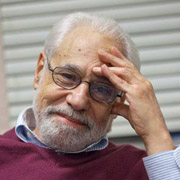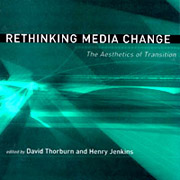EDUCATION
MIT's Communication Forum
conducts a conversation for scholars and citizens

A change has taken place in the human mind….the times are pregnant with change; and [our era]…will be known to posterity as the era of one of the greatest revolutions…The first of the leading peculiarities of the present age is, that it is an age of transition.
— John Stuart Mill, "The Spirit of the Age" (1831)
Set aside the nineteenth-century tonalities, and this passage could belong to our own era. Its apocalyptic rhetoric and its self-conscious awareness of change closely mirror the discourse of the digital revolution.
— Introduction, Rethinking Media Change, edited by David Thorburn and Henry Jenkins (2003)
The Foum explores how emerging media change our lives
How are new technologies transforming public discourse? Are traditional news outlets still influential in framing the news we get online? What are the legal dangers for publishing secrets in the crowd-sourced era? These are just a few of the questions recently addressed by the MIT Communications Forum.
Founded in 1978—well before the advent of the Internet—by the pioneering media scholar Ithiel de Sola Pool of MIT’s Political Science Department, the forum continues to engage leading scholars, journalists, media producers, and others around the globe in cutting-edge discussions on how emerging media are changing our world.
A rigorous and accessible conversation
“The forum aims to sustain an ongoing conversation about the cultural and political impact of all forms of communication, with special emphasis on new technologies,” says Director David Thorburn, who is also a professor in MIT’s Literature Section. “Our ideal is a discourse that is rigorous as scholarship and accessible to all serious individuals—a conversation for citizens.”
Panelists at discussions and conferences range widely across intellectual disciplines, professions, and media. Recent speakers have included TV commentator Juan Williams, former poet laureate Robert Pinsky, Professor Peter Donaldson, director of the Shakespeare Electronic Archive; Professor Mitchel Resnick of the Media Lab; and Science, Technology, and Society Professor Sherry Turkle, who discussed her views on of our increasingly wired lives.
A catalyst for ideas and research
While committed to reaching a general audience, the forum also plays a role in inspiring and disseminating media research among scholars in many disciplines. “The forum is one of MIT’s success stories,” Thorburn says, not only for nourishing discussion and research about the impact of emerging technologies, but also for its role in the formation of Comparative Media Studies (CMS), now one of the most popular undergraduate majors at the Institute.
CMS was partly an outgrowth of the Media in Transition project, which was organized by the Communications Forum to spur debate on the political impact of new media technologies. The initial series of Media in Transition conferences and forums ran from 1998 to 2000.


“Earlier periods of turmoil and change caused
by new media can tell us a lot about our current
experience of instability and transition.”
Taking a broad view
“We wanted to stimulate a discussion around the country and internationally that took a broad historical and theoretical perspective on mass communications,” explains Thorburn. “Earlier periods of turmoil and change caused by new media can tell us a lot about our current experience of instability and transition.”
For example, while the Digital Age seems to pose new concerns and conundrums, a study of the social history of communications reveals that technology—including the printing press, radio, and the movie camera—has changed the course of civic discourse many times over the generations. According to Thorburn, these transitions are typically less disruptive than they seem to contemporaries, suggesting that it’s best to find a middle ground between the “euphoria and the panic surrounding new media.”
Going global
The Media in Transition series led to two books, Rethinking Media Change: The Aesthetics of Transition and Democracy and New Media, and helped to demonstrate the depth and breadth of comparative media studies as an academic subject. Media in Transition conferences are now held every two years, jointly sponsored by the forum, CMS, and other partners. A significant feature of these conferences has been their increasingly international character. The conference held this May, for example, included presenters from 25 foreign countries.
“These international voices have nourished our conversations, of course, and they’ve also carried CMS principles beyond the U.S., into their own institutions and professional cultures,” Thorburn says. “The Forum is now known nationally and internationally.”
SPRING 2012 EVENTS
Adapting Journalism to the Web
Thursday, April 5, 5-7 pm | e14-633
Jay Rosen, NYU
Ethan Zuckerman, MIT
Electronic Literature and Future Books
Friday, May 4, 5-7 pm | Bartos Theater
Katherine Hayles, Duke University
Niick Montfort, MIT
Rita Raley, UC Santa Barbara
Moderator: David Thorburn, MIT
Future of the Book Symposium at MIT
Suggested links
Media in Transition | publications
Writer: Kathryn O'Neill
Editor and Art Director: Emily Hiestand
Photograph of David Thorburn: Jonathan Sachs